The iPad Air Review
by Anand Lal Shimpi on October 29, 2013 9:00 PM ESTiPhone to iPad: CPU Changes
Although the iPad Air uses the same A7 from the iPhone 5s (and M7 motion coprocessor), there are a few minor differences that do lead to better performance.
At a high level we’re still talking about two 64-bit Apple Cyclone cores with 128KB L1s (64KB I$ + 64KB D$) per core, a shared 1MB L2 cache and a 4MB L3 cache that services the entire SoC. Apple increased CPU frequency from 1.3GHz to 1.4GHz in the iPad Air, a mild increase but in line with what we’ve seen from previous iPad designs. That’s the first impact on performance - a 7.69% increase in CPU frequency.
The second impact on performance is something I only noticed while digging around under the hood of the A7. It seems like the implementation in the iPad Air can, for whatever reason, hold more instructions in flight (over 20% more) than the A7 in the iPhone 5s. It’s unclear to me whether the A7 in the iPad is configured any differently via firmware/microcode or if perhaps we’re looking at a slightly different revision of the core, but the delta was repeatable in my testing.
The third, and likely biggest change impacting the iPad Air’s implementation of the A7 is the additional thermal headroom afforded by the larger chassis. I’m not going to go into details on exactly what this next test does (unfortunately we’re going to occlude some of the low level work that we do in light of all of the benchmark cheating going on), but we’re looking at a curve of performance vs. time for a particularly power heavy mix of code. We’re running the same exact code on both the iPad Air and iPhone 5s here, the only real difference is the size of the chassis:
You can see the 5s throttles back its CPU frequency to about 1GHz after the 2 minute mark. The crazy thing is that until that point the 5s manages to run at full frequency without so much as a hiccup for two full minutes, running an incredibly power hungry task. Given that most iOS apps aren’t this power intensive for such a sustained period of time, iPhone 5s users should almost always see the A7 running at a full 1.3GHz. Pretty crazy.
The iPad Air by comparison shows much more controlled behavior. Early on in the test we see a 7.7% performance advantage, which lines up perfectly with the iPad Air’s 7.7% CPU frequency advantage. By the end of the test the iPhone 5s has throttled to 900MHz, while the iPad Air drops to around 1.2GHz. At this point the iPad Air’s performance advantage grows to almost 40%.
CPU Performance
I've gone through our standard set of cross-platform browser based benchmarks to place the iPad Air's performance in perspective. As I mentioned in our 5s review, I don't know that there are many (any?) applications on iOS 7 that can really take advantage of all the A7 has to offer. There's definitely a ton of headroom left in the design. What's particularly exciting is when the A7 ends up in n-1 or n-2 iOS devices and it becomes the minimum developer target going forward.
I won't go through all of the results here again, but it's safe to say that the iPad Air is the fastest ARM based tablet on the planet at this point.
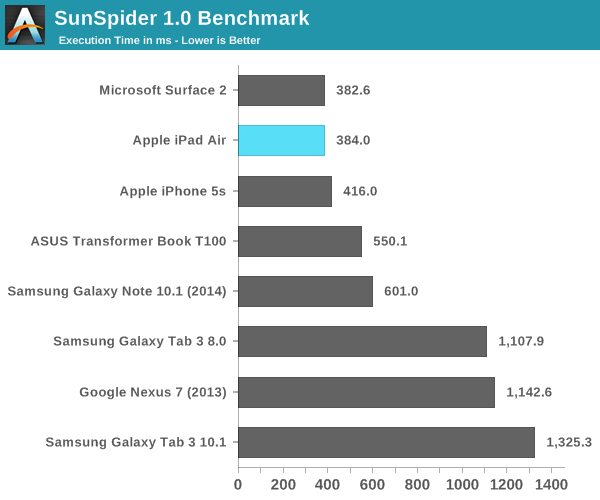
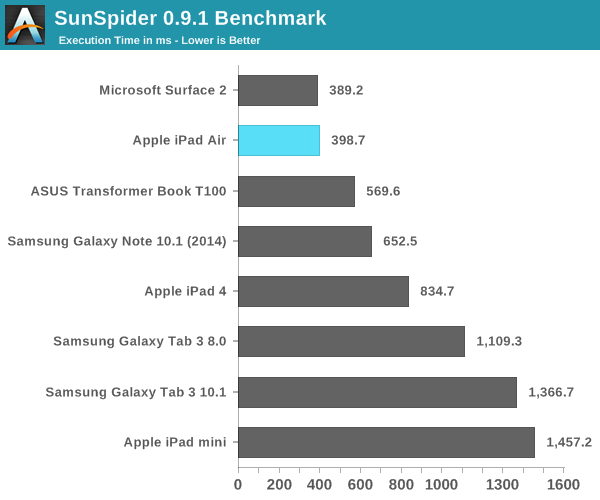
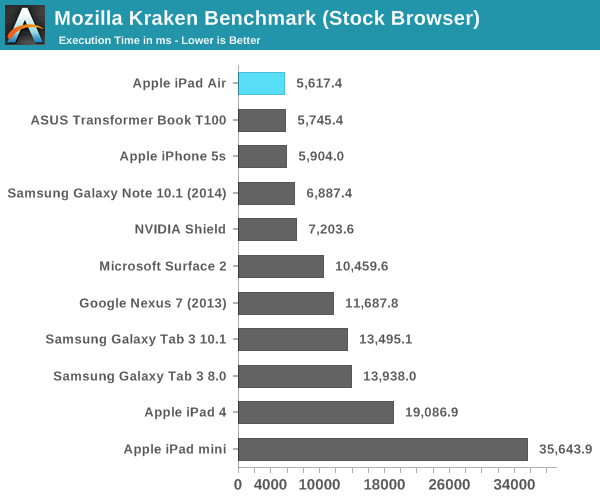
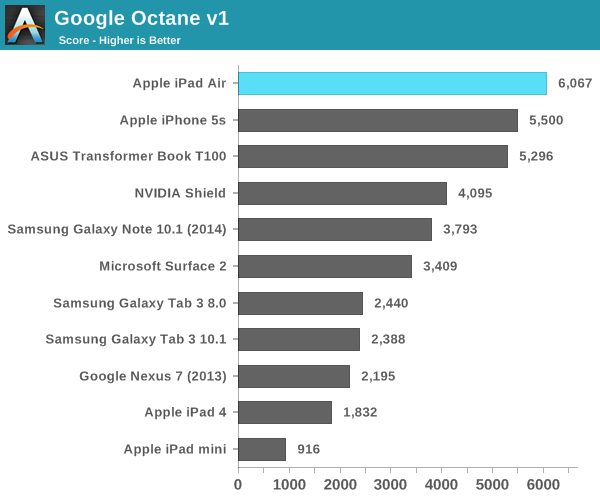
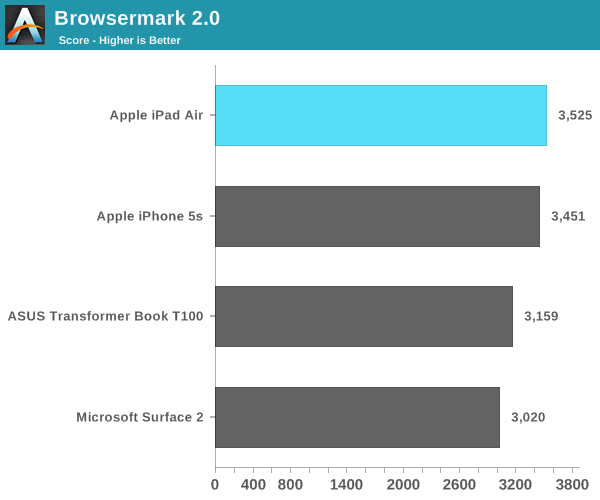
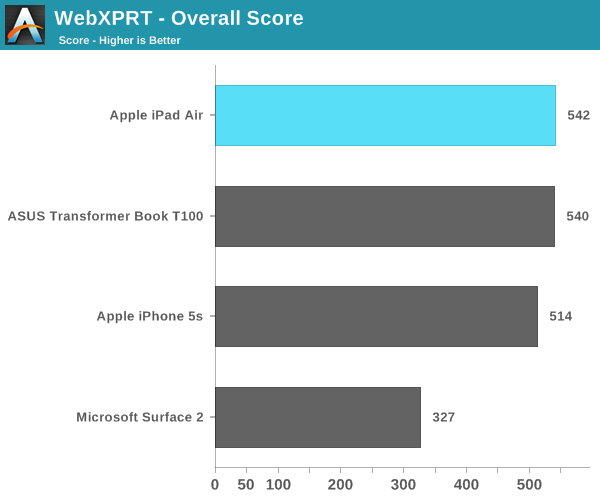
A7 Power Consumption
I’ll get to battery life in a bit, but I’ve been curious about the dynamic range of power consumption offered by Apple’s new A7 SoC. On the one hand we’re dealing with a lower power process (28nm vs. 32nm), but on the other hand Apple’s Cyclone cores can clearly draw more power given how beefy the architecture is this round. Apple frowns upon review sample dissection so I had to turn to a less scientific method of external platform level power measurement. The fidelity of the numbers here aren’t all that great but it’s better than nothing.
For the first test I measured platform power consumption during a Kraken run:
I purposely started measuring before the benchmark so I could get an idea of idle power consumption. The iPad Air consumes roughly 72% of the idle power as the iPad 4, both running at the same brightness. Here we’re not just seeing the A7’s advantages but also things like lower display power.
Focusing on the load portion of the measurement we see that both the new iPad and old iPad consume the same total power in this test. I suspect the A7 is drawing more power than the A6X, but it’s masked by a lower power display. Given how much faster the iPad Air is, Apple’s latest tablet features far lower overall task energy than the outgoing iPad 4. This is probably both the best case scenario for the iPad Air and the most likely case as well.
For kicks I wanted to see just how much power I could get the iPad Air to draw. Here I’m looking at platform power during our mini-power-virus test from above:
How’s that for dynamic range? Almost 12W running all out, but around half that in what we’d normally consider to be a stressful CPU test. I couldn’t get any actual applications/games on the iPad Air to behave like this so the results above are purely academic (for now). A quick run through GFXBench 2.7’s T-Rex HD test confirms that even pushing the GPU won’t hit these numbers. The max I saw running T-Rex offscreen was ~6W, and turning to an actual game (Infinity Blade 3) the iPad Air pulls less than 5W.


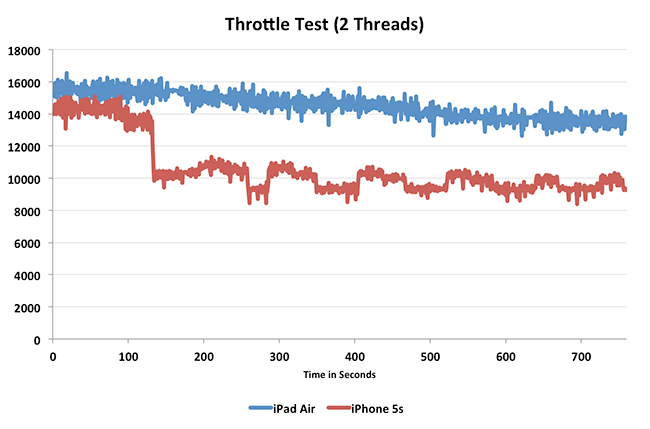
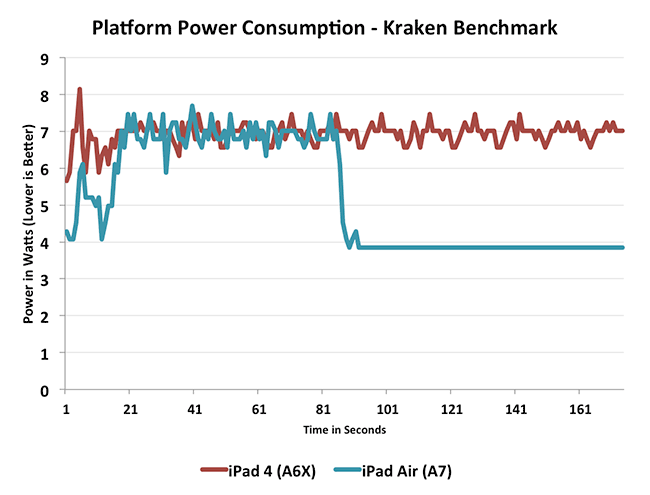
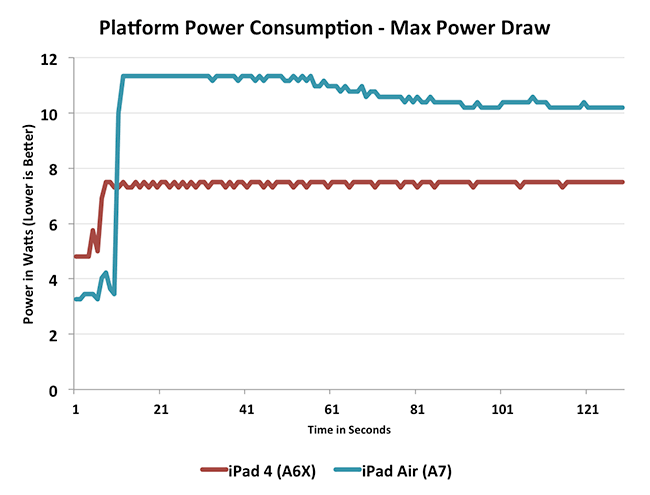








444 Comments
View All Comments
stevenvmc - Friday, November 1, 2013 - link
Yes, it is a deal breaker for me. I'm using iPad 4 with 1GB RAM and it keeps getting low memory. When I open several tabs in Safari (5-6 tabs), when switching among the tabs Safari will refresh the content which will cost data bandwidth if on 4G. And the thing is they may release another iPad Air with 2GB RAM in 6 months.Desplow - Thursday, October 31, 2013 - link
I still think the most significant iPad upgrade was the iPad 3 with retina display.jelloboy - Saturday, November 2, 2013 - link
I had the original iPad, the iPad 2 and the iPad 3 and now the Air. I will completely agree with the review - in your hand this is a HUGE upgrade over the 3. On paper it's not overly impressive, but it's something you have to hold to really appreciate it. I was on the fence about getting the Air but decided to go ahead and get one today after reading this review last night. I'm very impressed with the Air - I'd say got and see one yourself and then see what you think.Also the iPad 2 might have been the biggest upgrade - the speed difference between that and the first was greatly needed. By the time I got rid of my original iPad for an iPad 2 I was ready to throw the thing through a window because it just seemed so laggy. The iPad 3 obviously had the Retina screen, but basically is an iPad 2 in terms of performance. That's my opinion anyways.
shermanx - Thursday, October 31, 2013 - link
when is the MBP review coming out? really curious whether this time Apple has fixed the ghosting for Retina screens, which is not really mentioned in reviews available now.LittleB69 - Friday, November 1, 2013 - link
Great so this time they got it right!So now it runs Java and Flash without problems and can have other browsers installed that are not based on the safari rotkit. Support for more codecs, IR blaster for remote control, USB and NFC support and ....... or did they just make a thinner faster product with the same functionality as all the other devices?
Charles K - Friday, November 1, 2013 - link
Hello everyone, new here, sorry for the long (first) post and my english.I just wanted to say: I just bought the iPad air this morning after returning my nexus 7.2 for having a horrible aspect ratio, google asking for all my information in every app and just general lagginess.
Don't get me wrong, the device itself is fast, but there is a lot of input lag, and little freezes all the time when using chrome or just when navigating the play store. I had gotten it because it was definitely cheaper, but the device even crashed a few times in less than two days, and coming from the iPad Mini (which I absolutely loved but gave my girlfriend), this just won't do.
So now I figure, let's just shell out the extra cash and get the new iPad Air. I get the 16Gb "space gray", which looks much, much better on the iPhone, but still a beautifull device.
I fire it up, play a bit with it and boom, (first-world) problems.
There is a lot of screen input lag. I can't say precisely but definitely at least 100ms.It's still pretty fast, but using the tablet mainly for drawing and internet browsing, it really bothers me on such an expensive device.
My question is: I really didn't feel input lag to be that slow on the iPad Mini, and I don't know if it's due to the much higher resolution, or just iOS 7 itself, buit does anyone feel it too, and do you think it could be adressed by a future software update? Because i'm thinking of returning the device and just get another iPad Mini without retina display. I don't reaaally need the extra power and resolution, and size/weight is really what's more important to me. That and speed (not power if it makes sense)
Thank y'all, and great review Anan!!
ADGrant - Saturday, November 2, 2013 - link
If size and weight are your priority then you should get a Mini.As for lag, I haven't experienced any though I don't do much drawing. However, there is not a faster ARM tablet on the market and iOS has been measured as having much lower screen lag than Android.
Ken Esq - Friday, November 1, 2013 - link
I think Apple did a great job of cutting the weight down. Unfortunately, no matter how good their hardware is it's strangled by the overly simplistic iOS. I wish I could run Android or Win 8 on the iPad hardware.Ken Esq - Friday, November 1, 2013 - link
Although...it would be nice if reviewers made it very clear that Apple does not supply a GPS chip on any of the WiFi only iPads. I guess they save themselves a few cents.beggerking@yahoo.com - Saturday, November 2, 2013 - link
There are tons of tablets running full windows 8 for much less and work much better.Asus t100
Surface pro
Dell venue 8